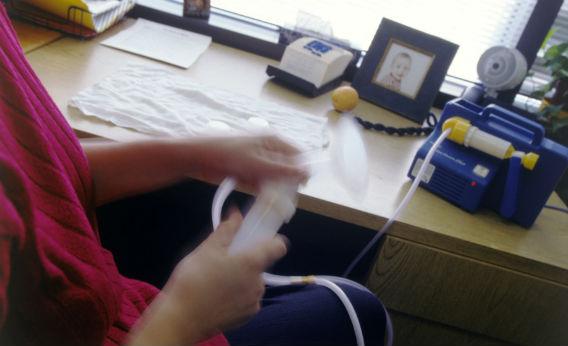Katie,
I’ll offer a different explanation for why the same book about the madness in modern parenting keeps getting written: No one is taking the advice. I keep waiting for parenting culture to turn, for mothers to anoint as their new role model one of the legions of self proclaimed bad mothers or tipsy mothers or even Betty Draper with her cigarettes and dry cleaning bag, and let go a little. But instead, in the decade since I had my first child, the rules have gotten even more stringent and it’s harder to find a decent bag of Doritos on anyone’s snack shelf.
I don’t think the fancy New York publicist is why Badinter’s book is getting attention. The book, as you’ve no doubt noticed, is a pretty dry read, wholly devoid of the cultural analysis and storytelling that an American counterpart would employ. If some publicist instructed Badinter on how to generate buzz, that publicist should be fired. I think it’s largely because she’s French, and we have lately been susceptible to cross-cultural parental bomb-throwing (Battle Hymn of the Tiger Mother, Bringing Up Bebe). There is something irresistibly uncomfortable about being so witheringly (and smugly) scrutinized from the outside. (I am a fan of Badinter’s but even I found myself annoyed when I got to the last chapter, “French Women: A Special Case,” in which she describes how her countrywomen are largely immune to this mania and thus so much better than us.)
Badinter’s innovation is to place “ecological motherhood” in a larger intellectual context. She convincingly ties it into our current fascination with neuroscience and its natural counterpart, biological essentialism—the idea that women’s brains and instincts are like this and men’s are like that, and thus we can only fulfill our true natures if we behave in a particular way in the first three months of a child’s life. I, like Badinter, am a Simone de Beauvoir groupie. I think the way we behave day-to-day is largely determined by cultural expectation, not some divine origin myth. The stories in attachment parenting books about how my cave-foremothers strapped on their infants with a strip of hide all day and slept with them all night (and therefore so should I) leave me cold. Sue me, but I want to get some sleep.
You are right, to some extent, that fretting over the bossy La Leche lady is a luxury of posh mothers like us. But American mothering is aspirational. Whatever we do (or think we have to do) for our children trickles down the social classes. When the Department of Health and Human Services launched its National Breast-Feeding Awareness Campaign, telling mothers they had to inform their employers that they needed to “take breaks throughout the day” to pump milk in a “clean quiet place,” they were not taking into account how that would make a new mother feel if she were, say, a waitress, or a home health care aide, or a bus driver. I would argue that it’s our responsibility to protect the less rich from this kind of guilt-inducing nonsense.
And even mothers unconcerned with La Leche or personal chefs for their toddlers pick up the message that good parenting requires constant engagement. Even as women have flooded the workforce, time-use studies show they spend at least as much or even more time with their children than women did in the Draper age. In fact, one study found that since 1995, women have almost doubled the amount of time they spend directly caring for their children to 21.2 hours a week
Dahlia Lithwick and Jan Rodak make this point in their Slate story last week on the ginned-up “war on women.” We talk about men’s battles as being centered around “freedom” and women’s as centered around “choice.” My choice to work versus my choice to breast-feed; my choice to have a coffee with a friend versus my choice to spend another hour teaching my child the alphabet. It’s a pretty brutal construction, and as Lithwick and Rodak wrote, you can almost hear the faint “unfortunate” before the word no matter what I choose. At least Badinter helps us lower the stakes on some of these “choices.”
Hanna
